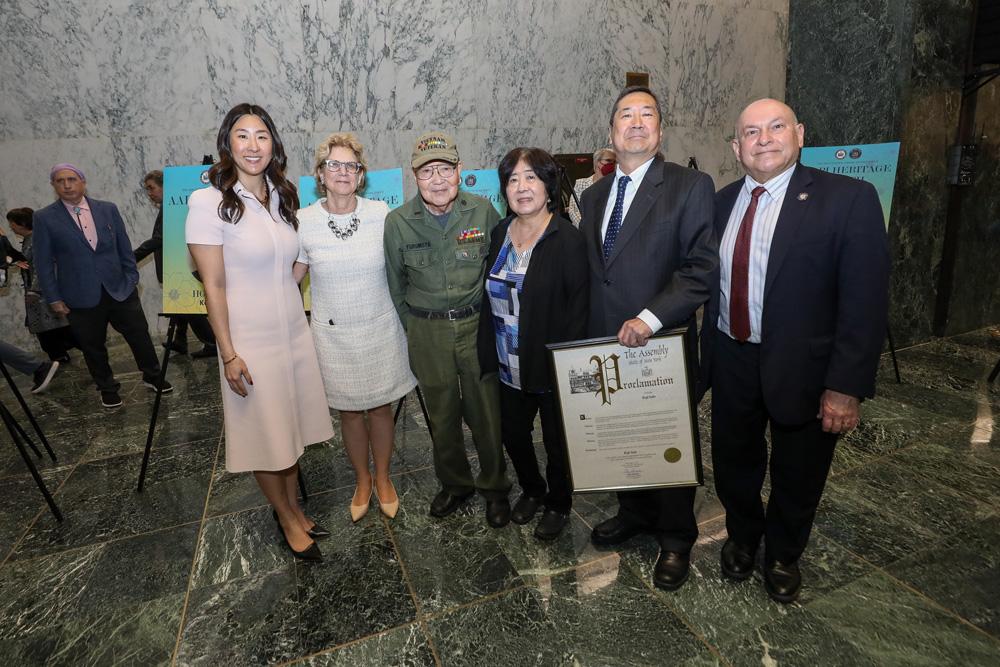
L to R: Assemblymember Grace Lee, Senator Shelley Mayer, Tak Furumoto, Carolyn Furumoto, Koji Sato, and Assemblymember Chris Burdick // Photo Courtesy of the New York State Senate Photography
New York State Senator Shelley B. Mayer announced her bill, S.8331, to establish January 30 as a day of commemoration known as “Fred Korematsu Day of Civil Liberties and the Constitution” has passed the Senate unanimously. Coinciding with the passage of this bill, Senator Mayer welcomed Koji Sato, Takeshi “Tak” Furumoto, and Carolyn Furumoto to Albany to be honored by the New York State Legislature for their work preserving the memory of Fred Korematsu and promoting knowledge of Japanese-American History. “Fred Korematsu Day of Civil Liberties and the Constitution” will be the first day of commemoration in New York State law for an Asian American.
Senator Shelley B. Mayer said, “I am honored to welcome Koji Sato, Tak Furumoto, and Carolyn Furumoto to Albany today. Their work for the Japanese-American community and promoting the legacy of Fred Korematsu is admirable and I am proud to sponsor the legislation to proclaim January 30 as Fred Korematsu Day of Civil Liberties and the Constitution, alongside my colleague Assemblymember Grace Lee, Co-Chair of the Asian Pacific American Task Force. I am grateful to Mr. Sato and Mr. and Mrs. Furumoto for their dedication to educating the next generation on the legacy of Japanese American history.”
In 1942, while the United States was fighting overseas, West Coast residents of Japanese descent were ordered to leave their homes and communities and were sent to internment camps for the duration of the war. According to the U.S. National Archives and Records Administration, over 120,000 people of Japanese descent, 70,000 of whom were American citizens, were forcibly moved to these camps.
Fred Korematsu was born in California to Japanese immigrant parents. At the start of the war, Mr. Korematsu tried to enlist but was denied. He was later fired from his job as a welder due to his Japanese ancestry. When his family was forced to relocate to an internment camp, Mr. Korematsu refused to go. Subsequently, he was arrested, convicted in federal court of disobeying a military order, and sent to a relocation camp. Mr. Korematsu appealed his conviction. His appeal eventually made its way to the United States Supreme Court.
In Korematsu v. United States, the Court upheld Mr. Korematsu’s conviction and the related policy under which the U.S. government ordered that individuals, including American citizens, be excluded from their homes and be detained indefinitely purely based on ethnic origin.
After the war, Mr. Korematsu was released from the internment camp and began to rebuild his life. He started a family, became a civil rights activist, and fought for the Japanese Americans who were deeply wronged during the war to ensure this did not happen to another community. His case was reopened and his conviction was overturned in 1984. However, the Supreme Court never officially overruled its determination in Korematsu v. United States.
Tak Furumoto is a Japanese American activist and a Vietnam War Veteran awarded the Bronze Star. Born in 1944 in the Tule Lake War Relocation Center, Mr. Furumoto moved to Hiroshima, Japan with his family following World War II. In 1956, he returned to the United States and settled in Los Angeles, California. After completing his education in California, he volunteered to serve in the U.S. Army in the Vietnam War as an intelligence officer.
Mr. Furumoto is the founder and Honorary Chairman of the New York Hiroshima-Kai, which forges a strong bond between the people of Hiroshima and the Northern United States and hosts an annual peace memorial in New York City to commemorate the atomic bomb victims in Japan. He is also a life member of the Japanese American Veterans’ Association and is a founding member of the Digital Museum of the History of Japanese in New York.
Carolyn Namie Furumoto was born to parents who were interned at the Tule Lake War Segregation Camp. Her parents moved to California upon their release, where they began their family. Carolyn met Tak in California and married after he returned from Vietnam. They moved to the East Coast where they settled in New Jersey and raised their son. In 1974, Mr. and Mrs. Furumoto formed Furumoto Realty, which specializes in placing Japanese executives in homes in the tri-state area and will celebrate its 50th year in business in 2024.
Koji Sato is President of the Japanese American Association Association of New York and Council Leader of the United States – Japan Council (JAA). A nonprofit organization founded in 1907, the JAA serves the Japanese and Japanese American communities throughout the tri-state area through social services, education programs, and community outreach. It also aims to strengthen the relationship between the United States and Japan.
Mr. Sato is also Co-Chair of the Asian American Advisory Board of Westchester County and serves on the Board of Governors of the Japanese American National Museum in Los Angeles. He holds a J.D. from New York Law School, is admitted to practice law in New York and Connecticut, and received his Bachelor of Arts degree from Colgate University.
Mr. and Mrs. Furumoto and Mr. Sato have long advocated for Fred Korematsu Day to keep the memory of Mr. Korematsu alive. Once S.8831 passes the New York State Assembly and is signed into law, New York will join California, New Jersey, Hawaii, Virginia, Michigan, and Arizona in declaring January 30 “Fred Korematsu Day of Civil Liberties and The Constitution.”
Watch Senator Mayer’s remarks on the Resolution honoring the Furumotos and Mr. Sato here and her remarks on the passage of S.8331 here.





